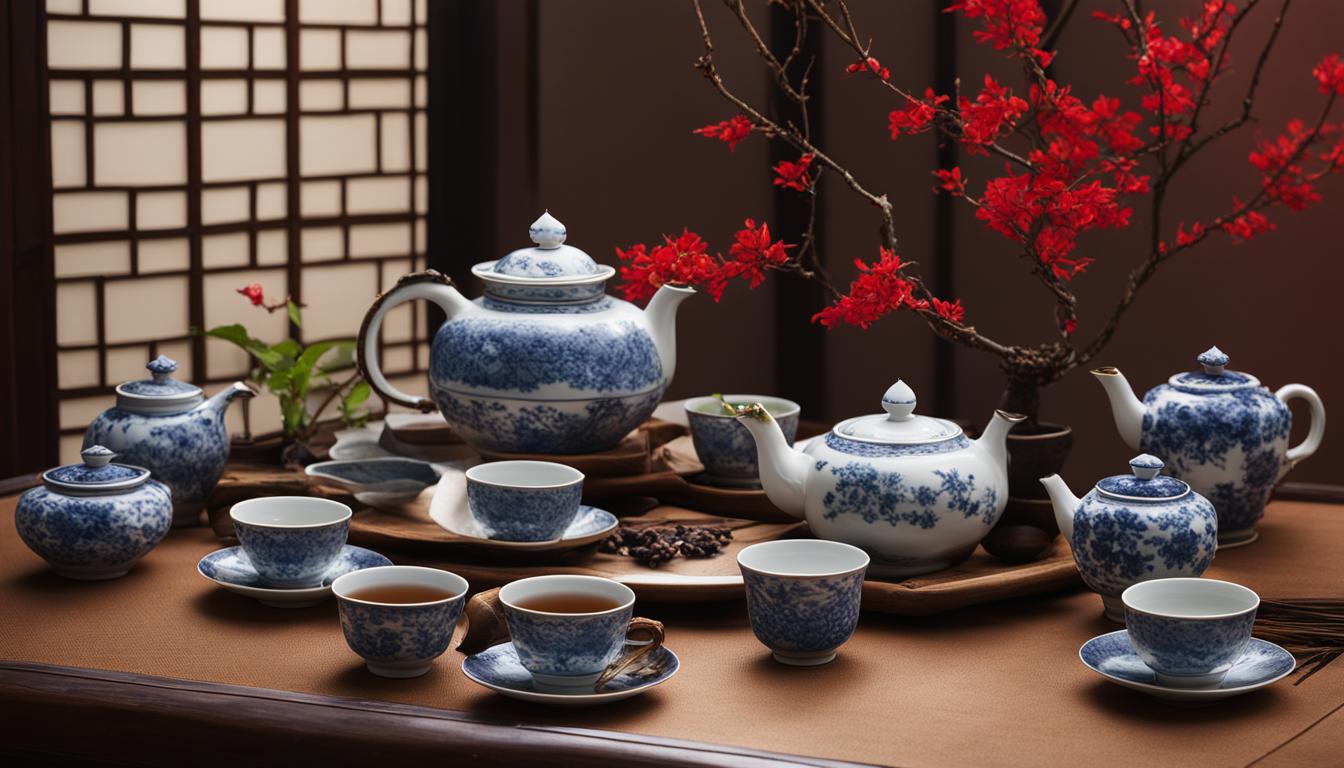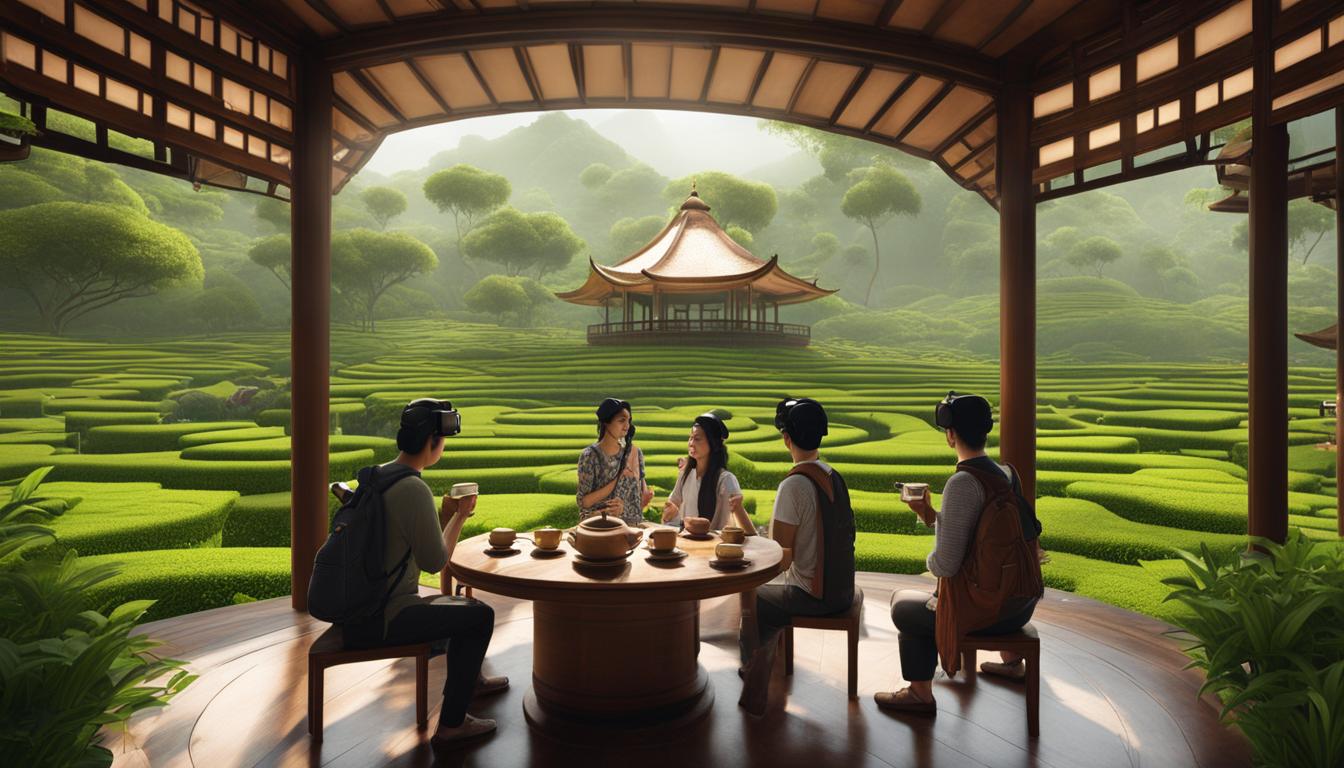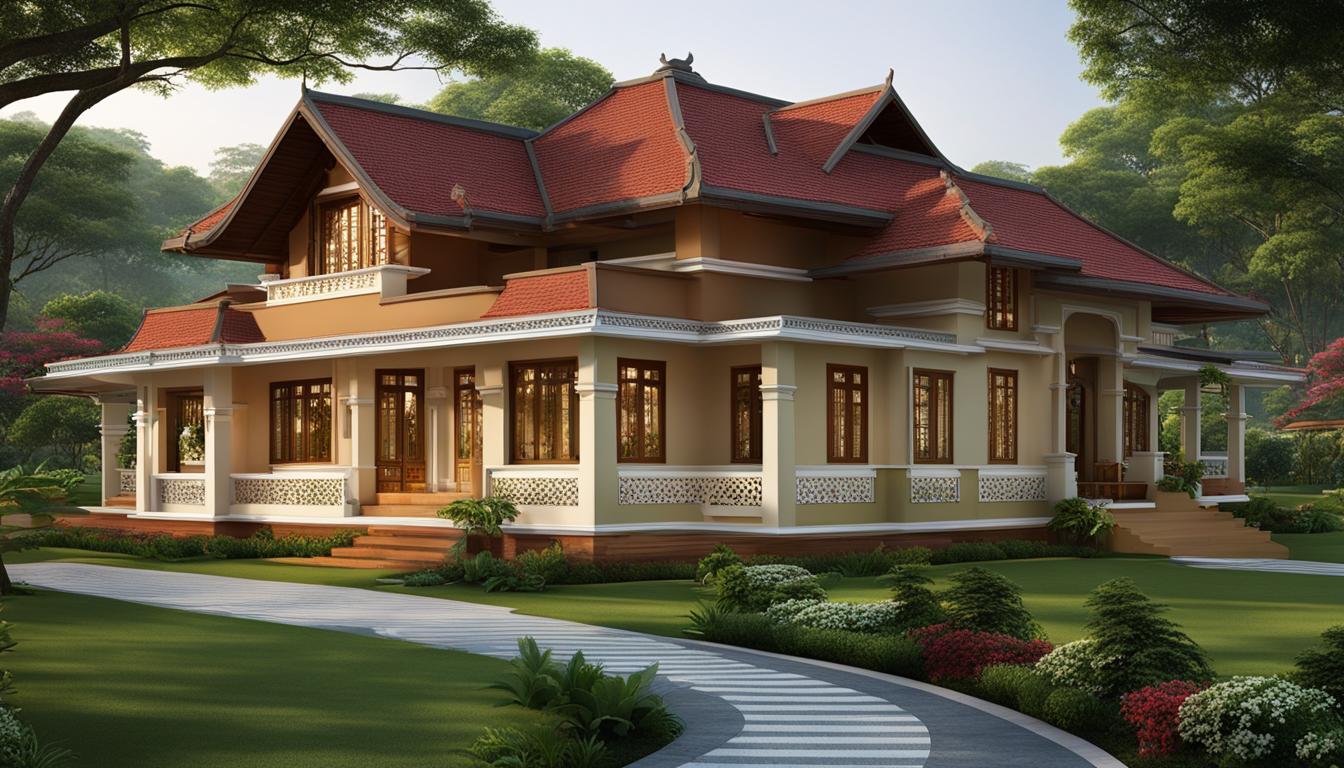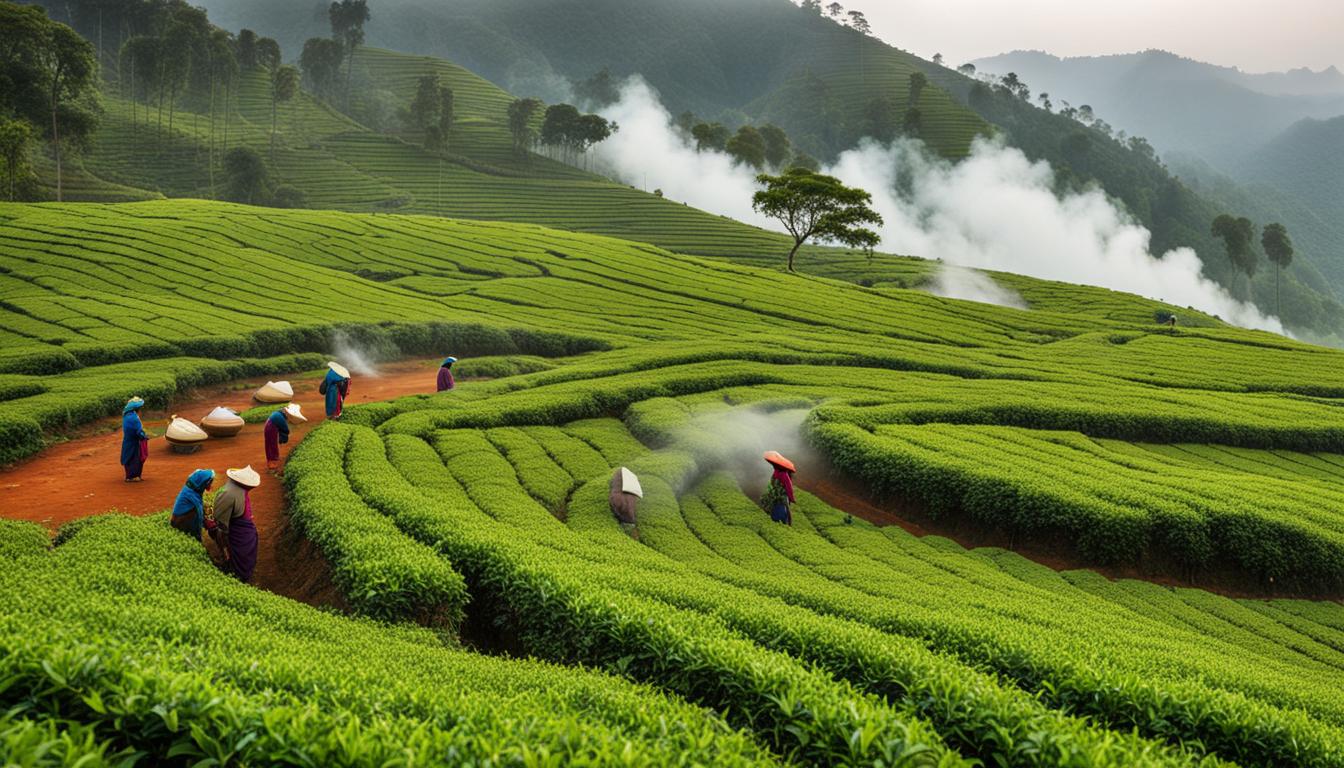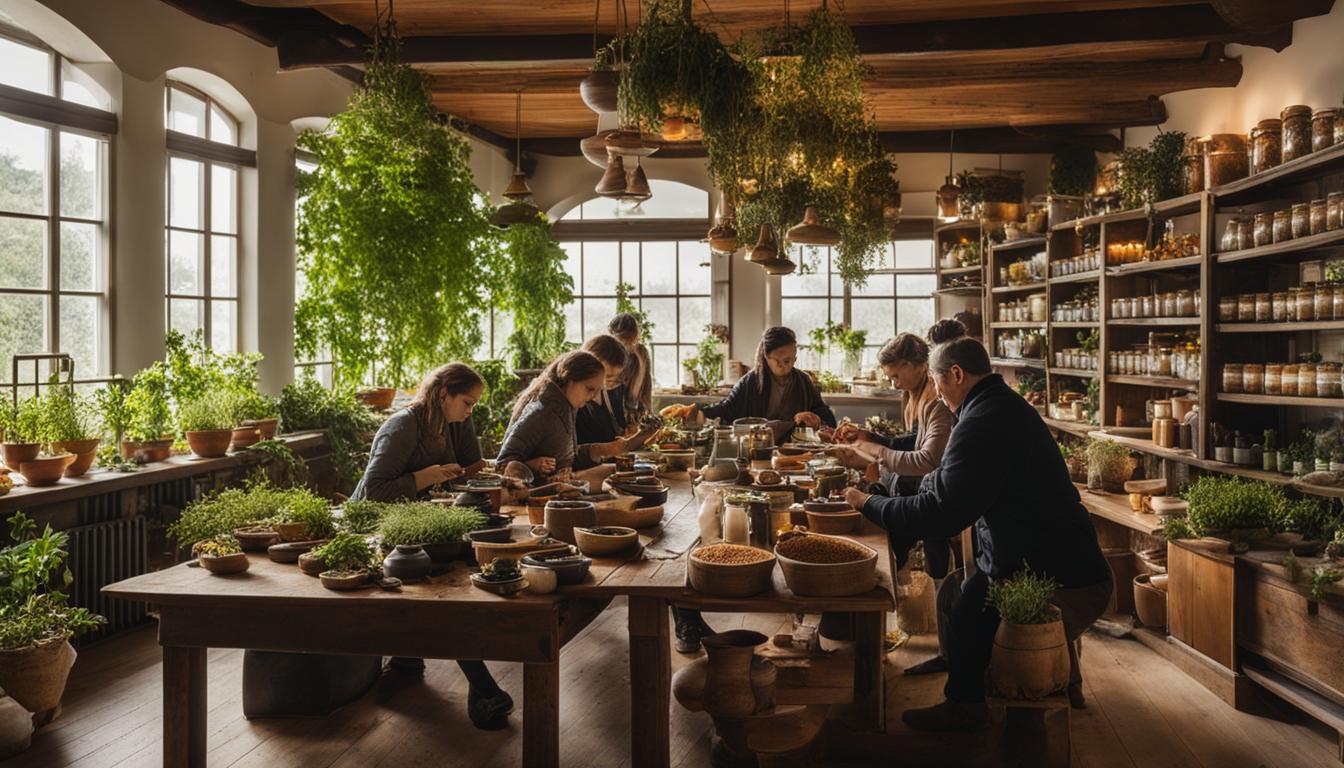Step into the enchanting world of Chinese tea culture, where the legacy of ancient tea masters lives on. From their intricate techniques to the captivating tea ceremonies they crafted, Chinese tea masters have left an indelible mark on the rich tapestry of China’s cultural heritage. Join us on a journey as we explore their wisdom, artistry, and the profound connection they shared with tea.
Key Takeaways:
- Chinese tea masters have played a significant role in shaping the legacy of tea culture.
- Their techniques and philosophies have been passed down through generations.
- Chinese tea ceremonies are steeped in history and tradition.
- Tea culture promotes harmony, peace, and well-being.
- Preserving and promoting Chinese tea heritage ensures its continued appreciation.
The Artistry of Chinese Tea Masters
Chinese Tea Masters possess a unique blend of teachings, artistry, and training that sets them apart in the realm of tea preparation and ceremony. These masters dedicate their lives to mastering every aspect of the art of tea, honing their skills to create a truly immersive and transcendent experience for tea enthusiasts.
The teachings of Chinese Tea Masters go beyond mere technical expertise. They encompass a deep understanding of the spiritual and cultural significance of tea. These masters learn to appreciate the intricate flavors and aromas of different tea varieties and understand how to bring out the best qualities of each infusion. With their expert knowledge, they guide tea lovers on a journey that engages the senses and nourishes the soul.
Chinese Tea Masters are trained in a wide range of brewing techniques, each meticulously designed to enhance the taste, aroma, and overall quality of the tea. They carefully control variables such as water temperature, tea-to-water ratio, and steeping time to achieve the perfect balance. Through their artistry, they transform a simple cup of tea into a moment of pure bliss.
The artistry of Chinese Tea Masters lies not only in their technical proficiency but also in their ability to create a harmonious environment that allows tea lovers to connect with themselves and the world around them. Through their teachings and ceremonies, they pass down the wisdom of centuries, keeping the traditions alive and inspiring future generations.
The artistry of Chinese Tea Masters is truly a testament to the beauty and depth of Chinese tea culture. Their teachings, artistry, and training combine to create an experience that transcends the ordinary and transports tea enthusiasts to a realm of serenity and enlightenment.
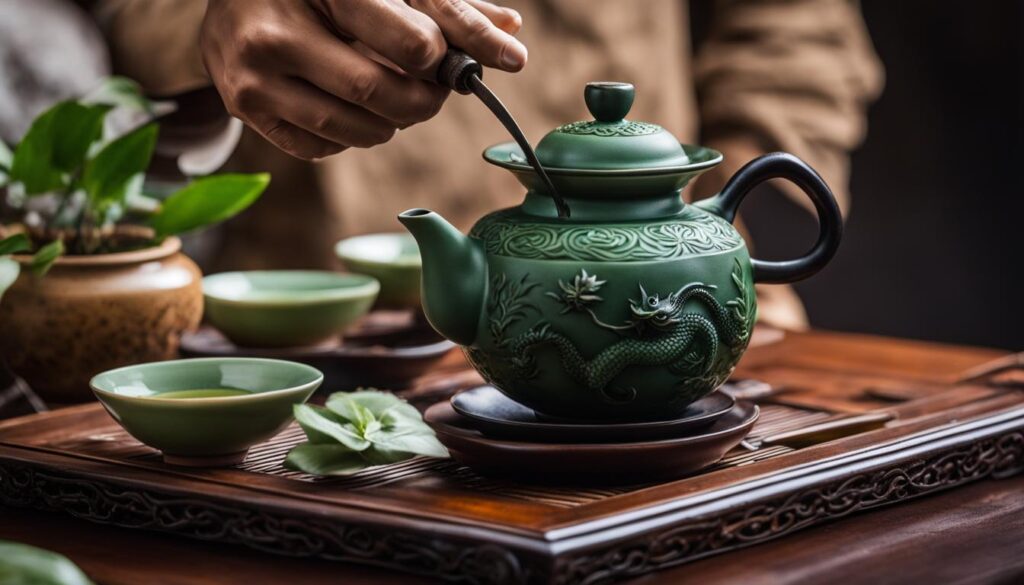
The Significance of Chinese Tea Ceremonies
Chinese tea ceremonies hold a profound significance in Chinese tea culture, representing the culmination of centuries of wisdom, traditions, and philosophies passed down by Historical Chinese Tea Masters. These ceremonies are not merely a way to enjoy a cup of tea, but rather a way to connect with nature, practice mindfulness, and embrace the principles of harmony and respect.
During a Chinese tea ceremony, every step is carefully choreographed and carries symbolic meaning. From the selection of tea leaves to the preparation of the tea, and the serving of each cup, each action is filled with intention and purpose. The ceremonies are designed to create a serene and immersive experience, inviting participants to slow down, savor the moment, and appreciate the beauty and flavors of the tea.
The Chinese Tea Master philosophies that underpin these ceremonies encourage us to be present, to cultivate inner peace, and to foster meaningful connections with others. The ceremonies remind us of the interconnectedness between ourselves, the natural world, and the community around us. They serve as a reminder to pause, reflect, and find solace in the simplicity and elegance of tea.
The Elements of a Chinese Tea Ceremony
A Chinese tea ceremony typically involves several key elements:
- Teaware: A variety of traditional teaware is used, including teapots, tea cups, and tea trays. These pieces are often intricately designed and reflect the rich cultural heritage of Chinese tea.
- Tea selection: Careful consideration is given to selecting the right type of tea for the ceremony, with different teas offering unique flavors and aromas that contribute to the overall experience.
- Water quality: The quality and temperature of the water used for brewing the tea are crucial. Chinese Tea Masters emphasize the importance of using fresh, pure water to enhance the flavors and ensure a satisfying cup of tea.
- Preparation: The tea leaves are steeped multiple times, with each infusion revealing different layers of flavor. Chinese Tea Masters skillfully control the brewing time and water temperature to extract the desired characteristics from the tea leaves.
- Serving: The tea is poured into small cups, which are then offered to each participant with a gesture of respect. The act of sharing tea symbolizes friendship, hospitality, and the unity of the group.
A Chinese tea ceremony is a meditative experience that encourages mindfulness, appreciation for nature, and a deeper connection with oneself and others. It is a celebration of Chinese tea culture and the enduring legacy of Historical Chinese Tea Masters, whose philosophies continue to inspire and guide tea enthusiasts around the world.
| Chinese Tea Ceremonies | The Significance |
|---|---|
| Celebration of Tradition | Chinese tea ceremonies honor the rich cultural heritage and wisdom passed down by Historical Chinese Tea Masters. |
| Mindfulness and Connection | These ceremonies promote mindfulness, appreciation for nature, and fostering meaningful connections with oneself and others. |
| Symbolism and Rituals | Each action in a Chinese tea ceremony carries symbolic meaning, and the rituals create a serene and immersive experience. |
| Tea as a Medium | Chinese tea ceremonies highlight the beauty and flavors of tea and emphasize its role as a medium for meditation and connection. |
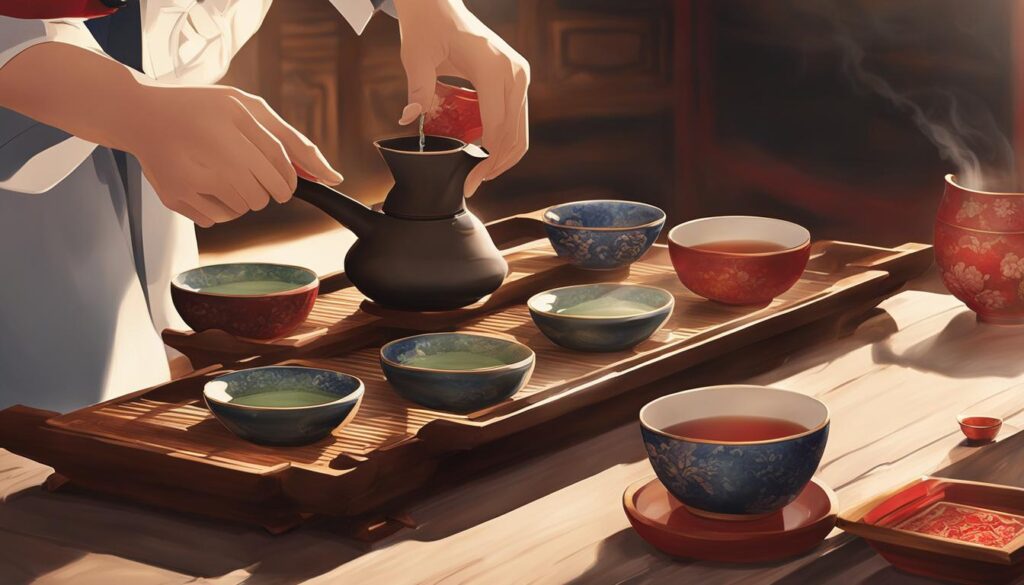
“In the art of tea, we reconnect with nature, practice mindfulness, and find inner peace. It is a journey that nourishes the soul and brings us closer to the wisdom of Historical Chinese Tea Masters.” – Anonymous
Exploring the Cultural Significance of Chinese Tea
The cultural significance of Chinese tea goes far beyond the simple act of drinking a beverage. It encompasses centuries-old traditions, the use of traditional Chinese tea sets, the appreciation of tea as a form of art, and the cultivation of a mindful and harmonious way of life. Chinese tea culture holds a special place in the hearts of the Chinese people and has been recognized as an important intangible cultural heritage.
One of the most visually captivating aspects of Chinese tea culture is the use of traditional Chinese tea sets. These sets are meticulously crafted with intricate designs and symbols that hold deep cultural meanings. They consist of tea pots, cups, strainers, trays, and other utensils that are carefully chosen to enhance the tea-drinking experience. The beauty and craftsmanship of these sets reflect the artistry of Chinese culture and add an element of elegance to the tea ceremony.
The Chinese tea ceremony, also known as “Gongfu Cha,” is a ritualistic practice that embodies the values of respect, harmony, and mindfulness. It is a solemn and meditative experience that requires the utmost precision and attention to detail. Every step of the ceremony, from the rinsing of the tea leaves to the pouring of the tea, is performed with grace and intention. The tea ceremony serves as a way to connect with oneself, others, and the natural world, fostering deep connections and promoting a sense of tranquility and well-being.
Chinese tea culture has had a profound influence on neighboring countries like Japan and Korea, where their own unique tea ceremonies and traditions have emerged. This demonstrates the far-reaching impact and universal appeal of Chinese tea culture. By exploring the cultural significance of Chinese tea, we gain a deeper understanding of the rich heritage and timeless wisdom that it embodies.
| Chinese Tea Culture | Traditional Chinese Tea Sets | Chinese Tea Ceremony |
|---|---|---|
| Centuries-old traditions | Meticulously crafted with intricate designs | Solemn and meditative experience |
| Appreciation of tea as a form of art | Reflects the artistry of Chinese culture | Requires precision and attention to detail |
| Cultivation of a mindful and harmonious way of life | Adds elegance to the tea ceremony | Fosters deep connections and promotes tranquility |
| Influences neighboring countries like Japan and Korea | Universal appeal and far-reaching impact | Embodies rich heritage and timeless wisdom |
The Health Benefits of Chinese Tea
Chinese tea is not only a beverage but also a source of numerous health benefits. For centuries, traditional Chinese medicine has recognized the healing properties of tea and incorporated it into various treatments. Chinese Tea Masters, with their extensive training and knowledge, understand how to harness the therapeutic qualities of different types of tea to promote overall well-being.
One of the key health benefits of Chinese tea is its ability to strengthen the body and boost the immune system. The natural antioxidants found in tea, such as catechins, help fight against free radicals and reduce the risk of chronic diseases, including heart disease and cancer. Regular consumption of Chinese tea also supports digestion, aids weight management, and improves mental clarity and focus.
Chinese Tea Masters play a significant role in unlocking the health benefits of tea. Through their training, they learn to prepare tea in specific ways to maximize its therapeutic effects. From the temperature of the water to the steeping time, every detail is carefully considered to ensure that the tea releases its beneficial compounds without losing its flavor and aroma.
Additionally, Chinese tea ceremonies conducted by the Tea Masters provide an opportunity for mindfulness and relaxation, which in turn contribute to improved mental and emotional well-being. The serene and meditative atmosphere created during these ceremonies allows participants to immerse themselves in the present moment, reducing stress and promoting a sense of calm.
Health Benefits of Chinese Tea
| Type of Tea | Health Benefit |
|---|---|
| Green Tea | Boosts metabolism and aids in weight management |
| Black Tea | Improves heart health and reduces the risk of stroke |
| Oolong Tea | Enhances mental alertness and focus |
| White Tea | Provides anti-aging benefits and promotes youthful-looking skin |
| Pu-erh Tea | Supports digestion and aids in weight loss |
“Tea is more than just a beverage; it is a natural remedy that improves our well-being and brings harmony to our body and mind.” – Chinese Tea Master quote
Preserving and Promoting Chinese Tea Heritage
Preserving the legacy of Chinese Tea Masters and promoting Chinese tea culture is vital in ensuring its continued appreciation and relevance. Efforts are being made to document the teachings and techniques of renowned Tea Masters, allowing future generations to learn from their wisdom. Educational programs, workshops, and cultural events are organized to raise awareness about Chinese tea culture and its historical significance. By sharing the knowledge and practices of Chinese Tea Masters, their legacy can be honored and cherished for generations to come.
Learning from Chinese Tea Masters is an opportunity to delve into the depths of Chinese tea culture. These Masters possess a wealth of knowledge and experience that can inspire and educate enthusiasts about the artistry and philosophy behind tea preparation and ceremony. Through apprenticeship programs and mentorships, aspiring Tea Masters can receive guidance and training, carrying on the traditions and techniques passed down by their predecessors.
Historical Chinese Tea Masters have left an indelible mark on tea culture. Their innovations and contributions have shaped the way tea is perceived and enjoyed. By studying their methodologies and approaches, we gain insights into the intricate details of tea preparation and the significance of tea ceremonies. Each Master had their unique style and philosophy, which adds to the richness and diversity of Chinese tea culture.
| Ways to Preserve and Promote Chinese Tea Heritage |
|---|
| Documenting the teachings and techniques of renowned Tea Masters |
| Organizing educational programs, workshops, and cultural events |
| Facilitating apprenticeship programs and mentorships |
| Studying the methodologies and approaches of Historical Chinese Tea Masters |
By actively engaging in the preservation and promotion of Chinese tea heritage, we ensure that future generations can continue to appreciate and learn from the wisdom of the Tea Masters. It is through these efforts that Chinese tea culture will thrive and flourish, keeping the legacy alive and inspiring tea enthusiasts around the world.
Quotes from Chinese Tea Masters
“Tea is not just a drink; it is a way of life. It teaches us patience, mindfulness, and the beauty of simplicity.” – Master Lin Zhen
“Preserving the legacy of Tea Masters means embracing their teachings and passing on the torch to future generations. It is our duty to ensure the continuity of this precious heritage.” – Master Zhang Jie
Conclusion
The legacy of Chinese Tea Masters and their ceremonies is a testament to the rich cultural heritage of China. It is a tradition that has withstood the test of time, captivating people with its artistry, philosophy, and profound connection to nature.
To truly honor the legacy of Chinese Tea Masters, we must delve into their teachings and embrace the wisdom they have passed down. Through their meticulous training and devotion, these Masters have unlocked the secrets of Chinese tea culture, revealing a world of mindfulness and serenity.
By preserving and promoting this legacy, we can ensure that the art of tea and the wisdom of the Masters continue to inspire and enrich our lives. Let us immerse ourselves in the beauty of tea ceremonies, savor each sip mindfully, and embrace the harmonious way of life that Chinese tea culture offers.
FAQ
What is Chinese tea culture?
Chinese tea culture encompasses the history of tea cultivation, brewing techniques, serving methods, tea ceremonies, and the artistry of Chinese Tea Masters. It has been an integral part of Chinese culture for centuries, influencing neighboring countries like Japan and Korea.
What do Chinese Tea Masters do?
Chinese Tea Masters are highly skilled individuals who have dedicated their lives to mastering the art of tea preparation and ceremony. They undergo extensive training to learn the intricate techniques and rituals associated with tea. These Masters not only possess technical expertise but also a deep understanding of tea’s spiritual and cultural significance.
What are Chinese tea ceremonies?
Chinese tea ceremonies are an integral part of tea culture, representing the culmination of the artistry and philosophies of Chinese Tea Masters. These ceremonies are steeped in history and tradition, with each step carefully choreographed to create a harmonious and immersive experience. They embody the principles of mindfulness, respect, and appreciation for the present moment.
What is the significance of Chinese tea culture?
Chinese tea culture goes beyond the mere act of drinking tea. It encompasses the use of traditional Chinese tea sets, the appreciation of tea as a form of art, and the cultivation of a mindful and harmonious way of life. Tea ceremonies highlight the importance of social interactions and the sharing of tea as a means of fostering connections and deepening relationships.
What are the health benefits of Chinese tea?
Chinese tea has long been regarded for its health benefits. It is believed to strengthen the body, promote relaxation, and improve overall well-being. Traditional Chinese medicine incorporates tea as a vital component, harnessing its healing properties to treat various ailments and restore balance in the body.
How is Chinese tea culture preserved and promoted?
Efforts are being made to document the teachings and techniques of renowned Tea Masters, allowing future generations to learn from their wisdom. Educational programs, workshops, and cultural events raise awareness about Chinese tea culture and its historical significance. By sharing the knowledge and practices of Chinese Tea Masters, their legacy can be honored and cherished for generations to come.

